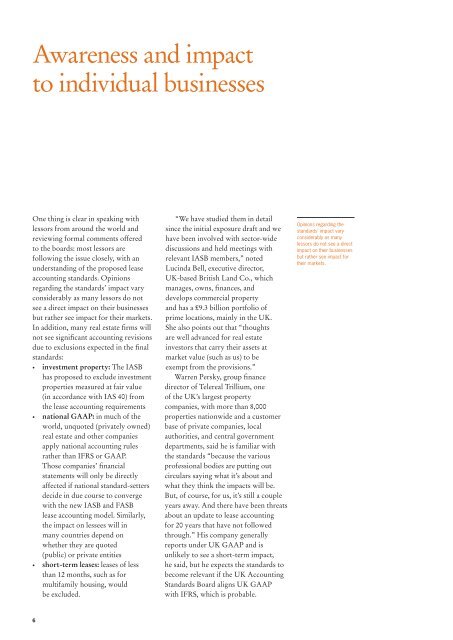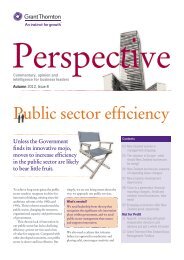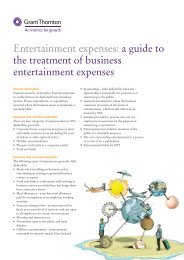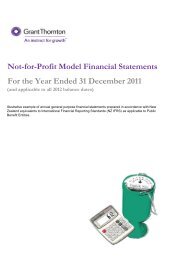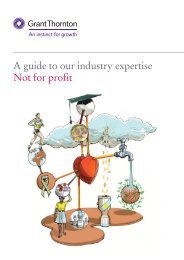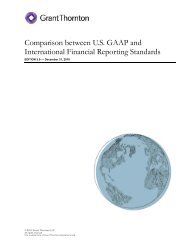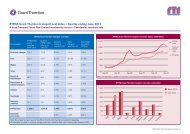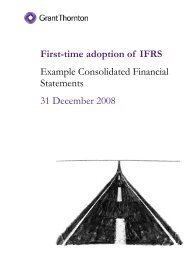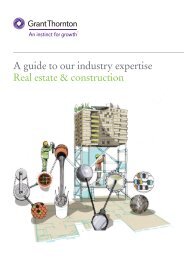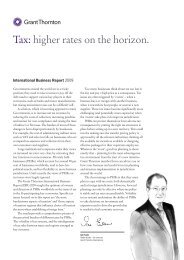Preparing for global lease accounting standards - Grant Thornton ...
Preparing for global lease accounting standards - Grant Thornton ...
Preparing for global lease accounting standards - Grant Thornton ...
Create successful ePaper yourself
Turn your PDF publications into a flip-book with our unique Google optimized e-Paper software.
Awareness and impact<br />
to individual businesses<br />
One thing is clear in speaking with<br />
lessors from around the world and<br />
reviewing <strong>for</strong>mal comments offered<br />
to the boards: most lessors are<br />
following the issue closely, with an<br />
understanding of the proposed <strong>lease</strong><br />
<strong>accounting</strong> <strong>standards</strong>. Opinions<br />
regarding the <strong>standards</strong>’ impact vary<br />
considerably as many lessors do not<br />
see a direct impact on their businesses<br />
but rather see impact <strong>for</strong> their markets.<br />
In addition, many real estate firms will<br />
not see significant <strong>accounting</strong> revisions<br />
due to exclusions expected in the final<br />
<strong>standards</strong>:<br />
• investment property: The IASB<br />
has proposed to exclude investment<br />
properties measured at fair value<br />
(in accordance with IAS 40) from<br />
the <strong>lease</strong> <strong>accounting</strong> requirements<br />
• national GAAP: in much of the<br />
world, unquoted (privately owned)<br />
real estate and other companies<br />
apply national <strong>accounting</strong> rules<br />
rather than IFRS or GAAP.<br />
Those companies’ financial<br />
statements will only be directly<br />
affected if national standard-setters<br />
decide in due course to converge<br />
with the new IASB and FASB<br />
<strong>lease</strong> <strong>accounting</strong> model. Similarly,<br />
the impact on lessees will in<br />
many countries depend on<br />
whether they are quoted<br />
(public) or private entities<br />
• short-term <strong>lease</strong>s: <strong>lease</strong>s of less<br />
than 12 months, such as <strong>for</strong><br />
multifamily housing, would<br />
be excluded.<br />
“We have studied them in detail<br />
since the initial exposure draft and we<br />
have been involved with sector-wide<br />
discussions and held meetings with<br />
relevant IASB members,” noted<br />
Lucinda Bell, executive director,<br />
UK-based British Land Co., which<br />
manages, owns, finances, and<br />
develops commercial property<br />
and has a £9.3 billion portfolio of<br />
prime locations, mainly in the UK.<br />
She also points out that “thoughts<br />
are well advanced <strong>for</strong> real estate<br />
investors that carry their assets at<br />
market value (such as us) to be<br />
exempt from the provisions.”<br />
Warren Persky, group finance<br />
director of Telereal Trillium, one<br />
of the UK’s largest property<br />
companies, with more than 8,000<br />
properties nationwide and a customer<br />
base of private companies, local<br />
authorities, and central government<br />
departments, said he is familiar with<br />
the <strong>standards</strong> “because the various<br />
professional bodies are putting out<br />
circulars saying what it’s about and<br />
what they think the impacts will be.<br />
But, of course, <strong>for</strong> us, it’s still a couple<br />
years away. And there have been threats<br />
about an update to <strong>lease</strong> <strong>accounting</strong><br />
<strong>for</strong> 20 years that have not followed<br />
through.” His company generally<br />
reports under UK GAAP and is<br />
unlikely to see a short-term impact,<br />
he said, but he expects the <strong>standards</strong> to<br />
become relevant if the UK Accounting<br />
Standards Board aligns UK GAAP<br />
with IFRS, which is probable.<br />
Opinions regarding the<br />
<strong>standards</strong>’ impact vary<br />
considerably as many<br />
lessors do not see a direct<br />
impact on their businesses<br />
but rather see impact <strong>for</strong><br />
their markets.<br />
“I think our philosophy has<br />
always been you do the right<br />
thing commercially and actually<br />
not let the <strong>accounting</strong> tail wag<br />
the dog because, you know, you<br />
just look at what’s in the best<br />
long-term commercial interest<br />
of the company.”<br />
Brian Bickell,<br />
Finance Director, Shaftesbury PLC<br />
Terry Bradshaw is executive VP<br />
and chief financial officer of American<br />
Asset Corp. (AAC), a diversified real<br />
estate company based in Charlotte,<br />
N.C., that owns suburban class A<br />
office, large-footprint retail, and<br />
industrial flex space—about 6 million<br />
square feet in the Raleigh and Charlotte<br />
metropolitan statistical areas (MSAs).<br />
Bradshaw said he’s well versed in the<br />
standard, although he did not submit<br />
a comment letter.<br />
“Given that a significant part<br />
of our business is investment in<br />
commercial property, the proposed<br />
changes to the leasing standard have<br />
the potential to see significant changes<br />
to our sector,” said an Australian real<br />
estate executive. “However, from<br />
a reporting perspective, the adoption<br />
of the fair value model means that<br />
as a lessor the measurements and<br />
disclosure requirements of the proposed<br />
changes do not apply to our investment<br />
portfolio.” The executive also noted<br />
that, despite its fair-value approach,<br />
his business is likely to feel some impact<br />
as it incurs costs in updating processes<br />
to capture and monitor the additional<br />
in<strong>for</strong>mation requirements associated<br />
with the new standard, particularly<br />
<strong>for</strong> contracts in which the company<br />
enters <strong>lease</strong>s as the lessee (a small<br />
part of its business).<br />
“Obviously, as a real estate investor,<br />
we’ve been carved out of having to<br />
apply the standard ourselves,” said<br />
Brian Bickell, finance director,<br />
Shaftesbury PLC, a real estate<br />
investment trust focused exclusively<br />
on London’s West End. Shaftesbury’s<br />
portfolio consists of shops and<br />
restaurants (about 70 percent),<br />
offices (20 percent), and residential<br />
(10 percent).<br />
“I suppose the point at which<br />
we became carved out, I probably<br />
[lost] interest in it as it doesn’t affect<br />
us directly but obviously could have<br />
an impact on our tenants,” continued<br />
Bickell. “I think our philosophy has<br />
always been you do the right thing<br />
commercially and actually not let<br />
the <strong>accounting</strong> tail wag the dog<br />
because, you know, you just look<br />
at what’s in the best long-term<br />
commercial interest of the company.”<br />
Howard Garfield is CFO<br />
of Behringer Harvard Multifamily<br />
REIT I Inc., a real estate investment<br />
trust based in Addison, Texas that<br />
acquires a portfolio primarily of<br />
high-quality multifamily communities,<br />
including conventional multifamily<br />
assets, age-restricted residences, and<br />
student housing. Garfield wrote<br />
a comment to the IASB and FASB,<br />
and has been in favour of changes <strong>for</strong><br />
lessees, but “when the scope of it was<br />
expanded to include lessors, I was quite<br />
opposed to it.” He called the lessor<br />
<strong>standards</strong> as proposed in the ED a<br />
“theoretical model” that characterises<br />
real estate as financing. “To call what<br />
real estate owners do as financing is<br />
just absurd. And to think that, now,<br />
people are going to start recognising<br />
interest income and changing their<br />
approach to real estate just shows how<br />
far a theoretical model is from the real<br />
world. This will truly trivialise GAAP,<br />
and we’ll all spend money.”<br />
Even among firms that do have to<br />
address the new <strong>standards</strong>, concern is<br />
primarily focused on costs to comply<br />
and the effects on markets and tenants<br />
6 7


